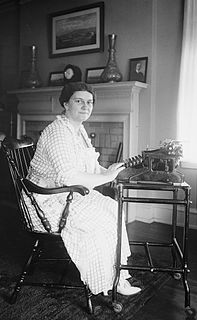A Quote by Evelyn Underhill
Mysticism, according to its historical and psychological definitions, is the direct intuition or experience of God; and a mystic is a person who has, to a greater or less degree, such a direct experience -- one whose religion and life are centered, not merely on an accepted belief or practice, but on that which the person regards as first hand personal knowledge.
Related Quotes
In mysticism that love of truth which we saw as the beginning of all philosophy leaves the merely intellectual sphere, and takes on the assured aspect of a personal passion. Where the philosopher guesses and argues, the mystic lives and looks; and speaks, consequently, the disconcerting language of first-hand experience, not the neat dialectic of the schools. Hence whilst the Absolute of the metaphysicians remains a diagram —impersonal and unattainable—the Absolute of the mystics is lovable, attainable, alive.
If you have a belief and you come against an experience which the belief says is not possible, or, the experience is such that you have to drop the belief, what are you going to choose — the belief or the experience? The tendency of the mind is to choose the belief, to forget about the experience. That’s how you have been missing many opportunities when God has knocked at your door.
What blinds us, or makes historical progress very difficult, is our lack of awareness that our beliefs have grown obsolete and should be put aside.... This is I think much of the problem of the modern dilemma: Direct experience has been discounted, and in its place all kinds of belief systems have been erected.... If you believe something, you are automatically precluded from believing its opposite; which means that a degree of your human freedom has been forfeited in the act of committing yourself to this belief.
Direct experience is inherently too limited to form an adequate foundation either for theory or for application. At the best it produces an atmosphere that is of value in drying and hardening the structure of thought. The greater value of indirect experience lies in its greater variety and extent. History is universal experience, the experience not of another, but of many others under manifold conditions.
If you have not had direct firsthand experience of loving a category of person - a person of a different race, a profoundly religious person, things that are real stark differences between people - I think it is very hard to dare, or necessarily even want, to write fully from the inside of a person.
God is not a person; God is manifestation itself. We think that God is a superhuman person, but God is not a person. He is not a subject. We can never experience God in a subject/object experience. God is what makes a subject/object experience possible. We can never see God or experience God as separate from ourselves. God is a being but there is no division.
The strongest wish of a vast number of earnest men and women to-day is for a basis of religious belief which shall rest, not upon tradition or external authority or historical evidence, but upon the ascertainable facts of human experience. The craving for immediacy, which we have seen to be characteristic of all mysticism, now takes the form of a desire to establish the validity of the God-consciousness as a normal part of the healthy inner life.
So often we experience things in life, and yet never see the connections between them. When we are given hardship, or feel pain, we often fail to consider that the experience may be the direct cause or result of another action or experience. Sometimes we fail to recognize the direct connection between the pain in our lives and our relationship with Allah SWT
In the dominant Western religious system, the love of God is essentially the same as the belief in God, in God’s existence, God’s justice, God’s love. The love of God is essentially a thought experience. In the Eastern religions and in mysticism, the love of God is an intense feeling experience of oneness, inseparably linked with the expression of this love in every act of living.





































